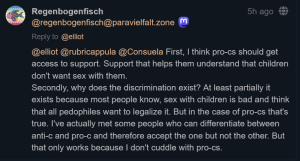One of our staff members is contributing considerably to a News Archiving service at Mu. Any well educated (Masters, PhD or above) users who wish to make comments on news sites, please contact Jim Burton directly rather than using this list, and we can work on maximising view count.
Preventionism: Difference between revisions
The Admins (talk | contribs) |
The Admins (talk | contribs) |
||
| Line 11: | Line 11: | ||
Nevertheless, destigmatization of attraction to minors is one central tenet of preventionist philosophy, since MAPs have to be willing to come forward in making contact with a care provider. Preventionists will sometimes point out that their focus on self-aware MAPs owes to the willingness of such people to make contact with a therapist when compared for example, to a person who is inclined towards or at risk of [[Wikipedia:Situational offender|situational offending]]. | Nevertheless, destigmatization of attraction to minors is one central tenet of preventionist philosophy, since MAPs have to be willing to come forward in making contact with a care provider. Preventionists will sometimes point out that their focus on self-aware MAPs owes to the willingness of such people to make contact with a therapist when compared for example, to a person who is inclined towards or at risk of [[Wikipedia:Situational offender|situational offending]]. | ||
==Primary prevention | ==Primary prevention targeting children: American schools== | ||
[[File:Extremeantic.png|thumb|Extreme [[anti-contact]] point of view from a German Preventionist MAP on [[pediverse]] in 2023]] | [[File:Extremeantic.png|thumb|Extreme [[anti-contact]] point of view from a German Preventionist MAP on [[pediverse]] in 2023]] | ||
Minors have often been targeted with primary prevention programs, particularly within the American context in the 1980s and 90s. However, more recently, these efforts have been modernized and integrated into broader child safety efforts, sex and relationships curricula. As early as 1992, German scholars were already highly critical of the American "child targeting" approach to prevention in schools, and did not recommend it for use in their own country.<ref>[[Media:Franke et al.pdf|How Preventive Are Child Sexual Abuse Prevention Programs? A Critique of School-Based Prevention Models in the United States. Journal of Sex Research (Germany) Vol. 5, Issue 1 (41-55) (March 1992)]]</ref> | Minors have often been targeted with primary prevention programs, particularly within the American context in the 1980s and 90s. However, more recently, these efforts have been modernized and integrated into broader child safety efforts, sex and relationships curricula. As early as 1992, German scholars were already highly critical of the American "child targeting" approach to prevention in schools, and did not recommend it for use in their own country.<ref>[[Media:Franke et al.pdf|How Preventive Are Child Sexual Abuse Prevention Programs? A Critique of School-Based Prevention Models in the United States. Journal of Sex Research (Germany) Vol. 5, Issue 1 (41-55) (March 1992)]]</ref> | ||
Revision as of 17:40, 31 December 2024

CSA Preventionism, sometimes referred to as (CSA) primary prevention with respect to MAPs, is a philosophy within medicine, the mental health industry and public institutions, in which targeted interventions are made to pre-empt and prevent Child Sexual Abuse.[1]
Controversy
Primary prevention of CSA remains a controversial idea as it involves a dialogue with the MAP Community, and efforts to reduce social stigmas, such as the supposition that all MAPs will inevitably "sexually assault children" and habitually deceive professionals as to their true intentions. The purgation of a highly detailed Wikipedia article on the topic in 2023 is a good example of this controversy.[2]
The idea, when applied to pedophiles and hebephiles (as in the famous German Prevention Project Dunkelfeld) is also controversial within the MAP Community. This is because preventionist philosophy appears to presuppose that attraction is the principal driver of behaviors. At the same time, we know that only a minority of child sexual offenders express preferential attractions to minors, and this number falls even further when one considers pedophilia alone. Preventionist philosophy has also been criticized as a totalizing blueprint for medical observation and control, fuelling undue suspicion. For example, Queer Theorists such as Richard Yuill and David Elliot[3] have made such criticisms in response to Sarah Goode.
Nevertheless, destigmatization of attraction to minors is one central tenet of preventionist philosophy, since MAPs have to be willing to come forward in making contact with a care provider. Preventionists will sometimes point out that their focus on self-aware MAPs owes to the willingness of such people to make contact with a therapist when compared for example, to a person who is inclined towards or at risk of situational offending.
Primary prevention targeting children: American schools

Minors have often been targeted with primary prevention programs, particularly within the American context in the 1980s and 90s. However, more recently, these efforts have been modernized and integrated into broader child safety efforts, sex and relationships curricula. As early as 1992, German scholars were already highly critical of the American "child targeting" approach to prevention in schools, and did not recommend it for use in their own country.[4]
A problem with preventionism
What researchers say about primary prevention approaches.
- Schmidt, A. F., & Niehaus, S. (2022). Outpatient Therapists’ Perspectives on Working with Persons Who Are Sexually Interested in Minors Archives of Sexual Behavior, DOI: 10.1007/s10508-022-02377-6
- “This exemplifies the–at least partly–diverging therapeutic foci between therapists and patients as therapists seem to prioritize sexual behavior regulation issues and sexual offense prevention, whereas MAPs experience problems with psychological well-being and stigmatization issues as more crucial (B4U-ACT, 2011; Levenson & Grady, 2019a). This divergence in therapeutic foci is likely among the reasons reason why MAPs are reluctant to seek professional help or report dissatisfaction with it (Levenson & Grady, 2019a).”
- “In summary, our results further corroborate that MAPs’ reported fears of being stigmatized by (mental) health professionals are not unfounded (B4U-ACT, 2011; Levenson & Grady, 2019a).” [...] “In order to increase the chances of this underserved clientele finding access to professional help to deal with their considerable burden of psychological distress (Lawrence & Willis, 2021), particularly outpatient therapists who yet refuse to work with MAPs as well as future therapists in training should be made aware of the principles outlined in B4U-ACT (2020), Jahnke (2018a), and Levenson et al. (2020) who recommend guidelines to decrease stigmatization of MAPs and increase professional certainty and competences in therapeutically working with them.
- Stephens, S., McPhail, I. V., Heasman, A., & Moss, S. (2021). Mandatory reporting and clinician decision-making when a client discloses sexual interest in children. Canadian Journal of Behavioural Science / Revue canadienne des sciences du comportement, 53(3), 263–273.
- "Many individuals with sexual interest in children express a desire for mental health services but represent an underserved client population. An identified barrier to service provision is mandatory reporting legislation. [...] [S]tigma towards people with sexual interest in children was associated with an increased likelihood of reporting. Clinicians were more likely to indicate that they would report the hypothetical client was viewing child sexual exploitation material and/or had access to children."
Groups who advocate for primary prevention
- Prostasia Foundation
- Virtuous Pedophiles
- Troubled Desire - I.e. outreach arm of the German Prevention Project Dunkelfeld.
See also
- NOMAP
- Anti-contact
- Allyn Walker - Arguably the most famous preventionist.
- Sarah Goode - Early preventionist.
- Klaus Beier - German preventionist.
External links
Sourced primers from a preventionist perspective
- CSA primary prevention - The censored Wikipedia article in full
- Primary Prevention - Dry as bones primer from a known MAP Author
Organizations and websites
- End The Stigma
- The P Word
- Help Wanted - Preventionist initiative of Johns Hopkins
- ASAP International - Founded by a Minor Attracted Person
- Troubled Desire
- Schicksal und Herausforderung, and Wir sind pädophile Menschen - German
- Global Prevention Project - Candice Christiansen is a sex-addiction therapist who serves on the United Nations Human Trafficking Task Force
- CSA Primary Prevention
- Shadows Project
References
- ↑ TNF: Rant on primary Prevention
- ↑ Primary Prevention of CSA (old version), Primary Prevention of CSA (archive) and redirect
- ↑ Yuill, R., & Elliot, D. (2012). Researching and Theorizing the “Age Taboo” on Intergenerational Sexualities. Journal of LGBT Youth, 9(1), 67–71.
- ↑ How Preventive Are Child Sexual Abuse Prevention Programs? A Critique of School-Based Prevention Models in the United States. Journal of Sex Research (Germany) Vol. 5, Issue 1 (41-55) (March 1992)